Recent Articles
Popular Makes
Body Types
2017 Chevrolet Colorado Road Test and Review
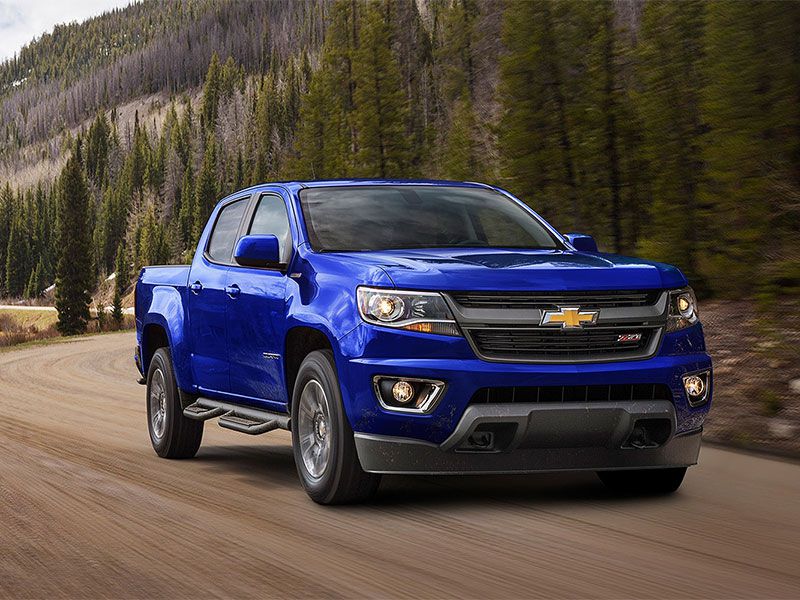
2017 Chevrolet Colorado exterior front angle ・ Photo by General Motors
Some time in the not-too-distant past, compact pickups became midsize pickups. If any truck can make that claim, it’s the Chevrolet Colorado—not just for its size, but for its ability to do the tough jobs that other midsizers can’t handle.
Impossible not to like.
As someone who spends a fair amount of time in pickup trucks, I find it almost impossible not to like the Chevrolet Colorado (er, not that I was really trying to dislike it). It's easy to scoff at the midsize label—as far as I can tell, the current Colorado is about the same size as the old (2003-2012) version, and didn't we all call that one a compact?—but whatever size class you choose to put it in, the Colorado 's an extraordinarily convenient size of truck. The Gold family owns a fullsize pickup—a 20-plus-year-old Chevy that we use almost exclusively as a work implement, primarily towing a horse trailer and hauling bales of hay—and I've reviewed more pickup than I can remember, so I can really appreciate the merits of the Colorado's size.
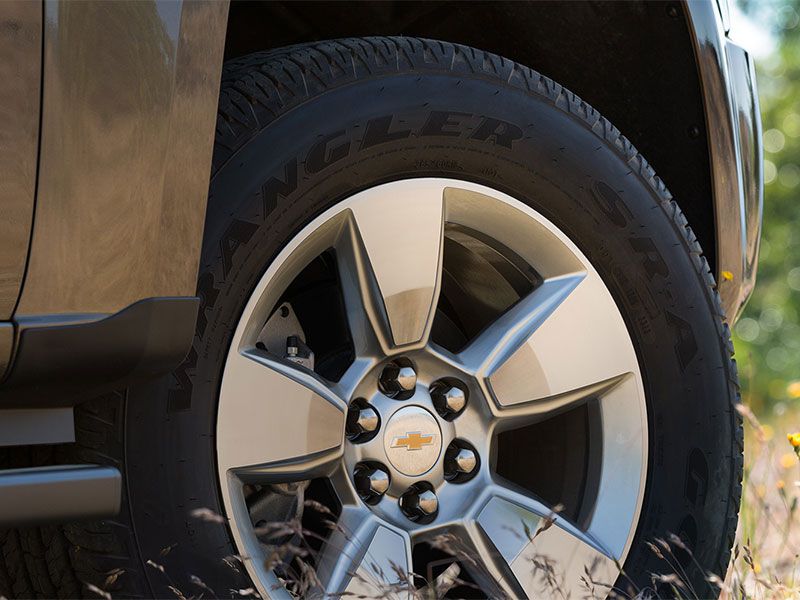
Photo by General Motors
Not too big...
The first thing I like about the Colorado is that it isn't too big. Fullsize pickups can be a real pain in the neck, especially now that our roads and towns have largely adopted to smaller vehicles. The Colorado is closer in width to what passes for a large car these days, so parking is the primary benefit, especially in crowded lots (which we have no shortage of in my hometown of Los Angeles). The Colorado is also easier to handle in town, whether you're squeezing through narrow gaps in traffic or pulling from a narrow street into an even narrower driveway. The Colorado's crew cab is lower to the ground than some big pickups, so it's easy to get in and out of. And though its wheelbase is quite long for a smaller truck, it doesn't shake on sectional freeways the way some big pickups do.
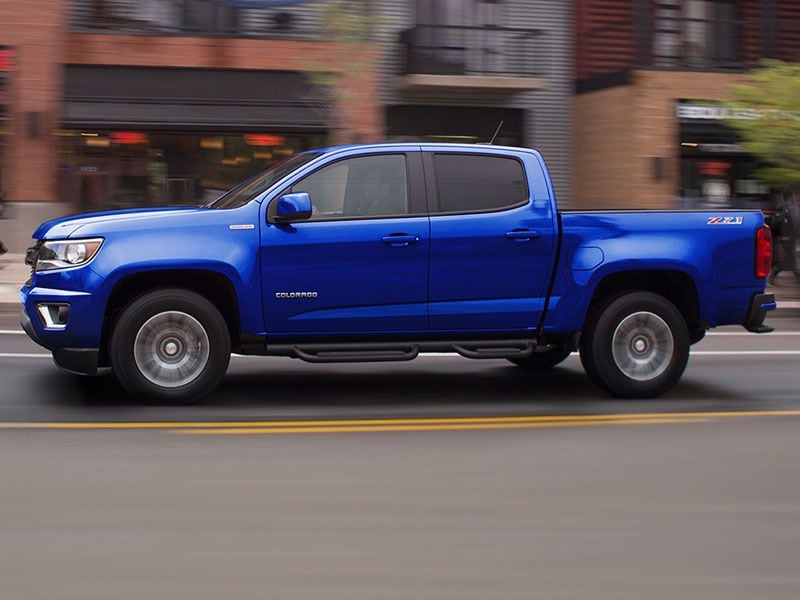
Photo by General Motors
...and not too small.
The second thing I like about the Colorado is that it isn't too small. Older compact pickups feel like tiny cars inside, but the Colorado gives its occupants a decent amount of shoulder room. You aren't separated by a giant gap as you would be in a big pickup, but nor are you crowded together like college students stuffing themselves into the cabin on a night out. The Colorado doesn't feel like a runt on the road, either; it puts its occupants high enough that they get a good view out over traffic. You still feel like you're driving a truck.
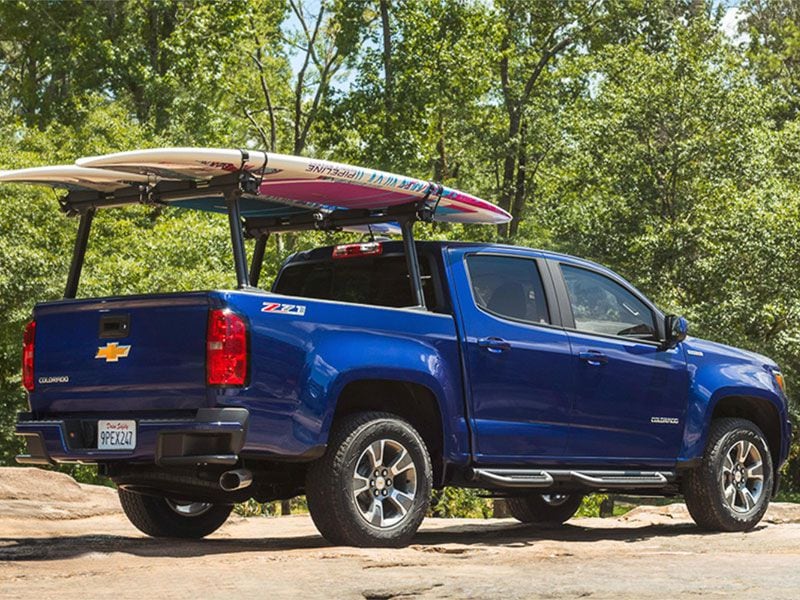
Photo by General Motors
A sensible control layout.
I was very impressed by the Colorado's cab. Chevrolet's interior designers have their priorities right: The control layout is sensible and logical, and it's easy to learn your way around. There's plenty of space on the Colorado's dashboard, and the Colorado puts it to good use, spreading out the controls and making the labels big enough to see easily. I'm a fan of Chevrolet's Intellilink infotainment system, though I do find that it sometimes tries to cram too much information onto the screen at once; using the navigation system, I sometimes found myself able to see only a sliver of the map.
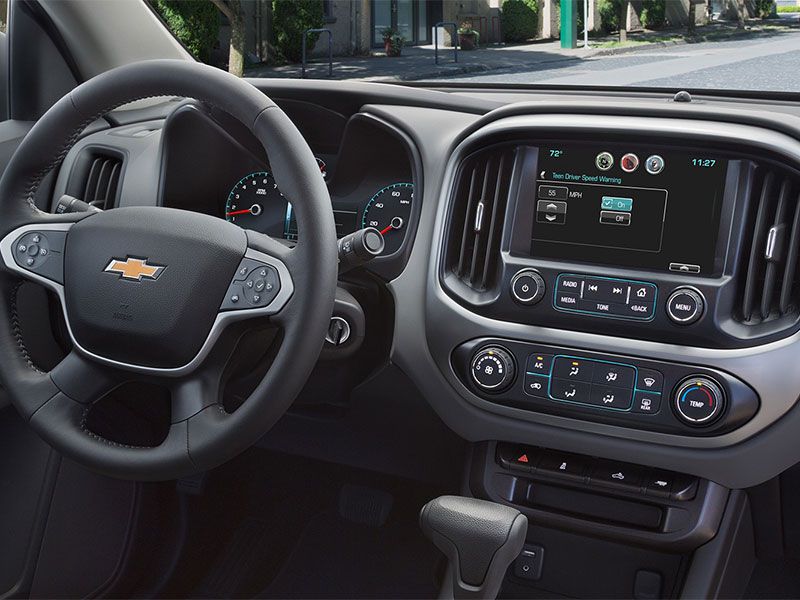
Photo by General Motors
Plenty of room in the cab.
My Colorado test truck had a 4-door crew cab, and here again we see the advantage of size. There's plenty of headroom, and legroom for back seat passengers is comparable to that of a small car. The seat itself is reasonably comfortable and supportive; I've sat in fullsize extended-cab pickups that didn't have as much room. The Colorado is roomy enough to serve as a family truck, the only caveat being storage space—there's not much room by the passengers' feet, so any luggage has to ride back in the bed. If I were going to make any serious complaints about the cabin, it'd be about the material quality. The cabin of the Colorado doesn't exactly feel cheap, but nor is it as nicely finished as Chevy's Silverado half-ton trucks, and it doesn't help that cloth-and-leatherette is the only upholstery choice. A little more money spent on the plastics, and perhaps the option of genuine cowhides, would make the Colorado's cabin quite a bit more pleasant.
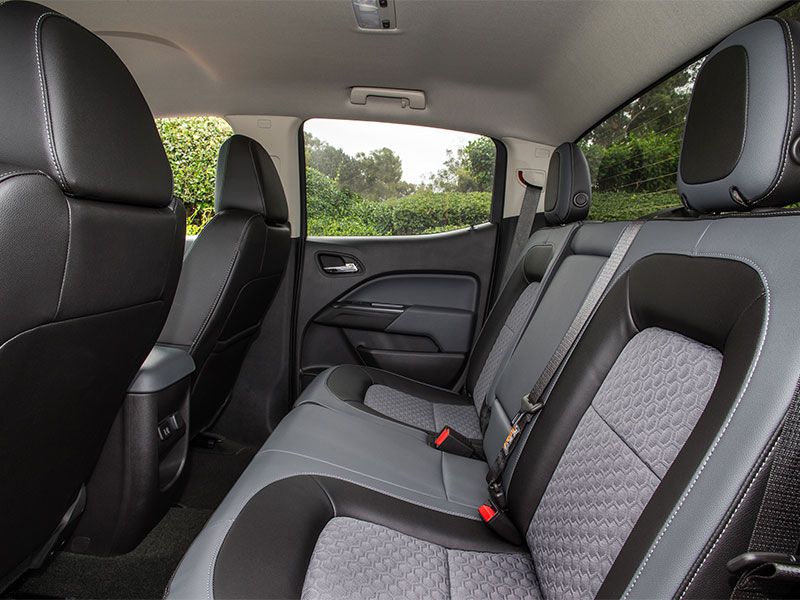
Photo by General Motors
A nice mix of power and economy.
Of course, one of the key advantages to a smaller pickup is economy. Our test truck was equipped with GM's ubiquitous 3.6-liter V6, delivering 308 horsepower and 275 lb-ft of torque. This engine delivers strong acceleration and, with its 8-speed automatic, decent fuel economy for a truck. The EPA rates the 4x4 Colorado I drove at 17 mpg city and 24 mpg highway—4x2 models are rated 1 mpg higher—and I averaged 21.9 Mmpg, just as promised. Base-model Colorados come with a 200 hp 2.5-liter 4-cylinder, available with either a 6-speed manual or a 6-speed automatic, but it limits towing to 3,500 lbs, as opposed to 7,000 lbs with the V6. But it doesn't have any effect on payload. Depending on how it is equipped, the Colorado can haul between 1,492 and 1,574 lbs in the box.
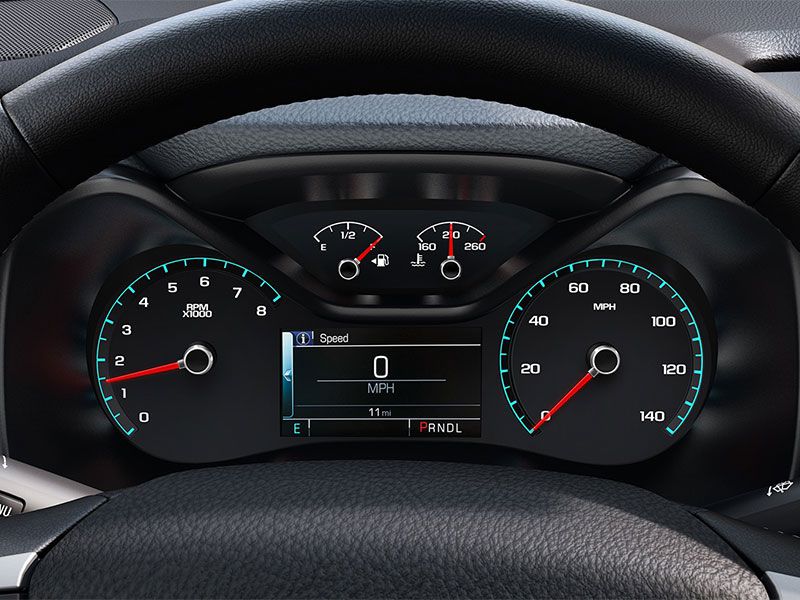
Photo by General Motors
Towing with the Chevy Colorado
If you're looking for more towing capacity—or better fuel economy—you'll want to check out the Colorado's optional 2.8-liter Duramax turbodiesel, which comes exclusively with a 6-speed automatic transmission. EPA fuel economy is 22 city/30 highway with 2-wheel drive and 20/28 with 4-wheel drive. Equipped with the Duramax diesel, the 4x2 Colorado tows 7,700 lbs, while the 4x4 tows 7,600 lbs. And just to drive the message home, diesel-powered Colorados come with a built-in electric trailer brake controller. (Gas-powered Colorados can be had with a towing package, but you'll need to wire in your own controller; there are wires for a generic harness, but no built-in plug.) A few months back, we tested a diesel-powered version of the Colorado's slightly-more-upscale sibling, the GMC Canyon, by hooking up our horse trailer (with a loaded weight of 4,900 lbs) and heading for the hills. We had our doubts at first—the truck looks quite a bit smaller with a big horse trailer hooked up—but the Canyon impressed us. It felt rock solid and just as stable as some of the half-ton pickups we've used to tow the same trailer. We've towed the trailer (empty) with other small trucks, including the Toyota Tacoma and the Honda Ridgeline, and they didn't exhibit the same stability. When towing the horse, safety is our first concern, and the Colorado and Canyon are the only small pickups we'd trust with the life of our big furry friend.
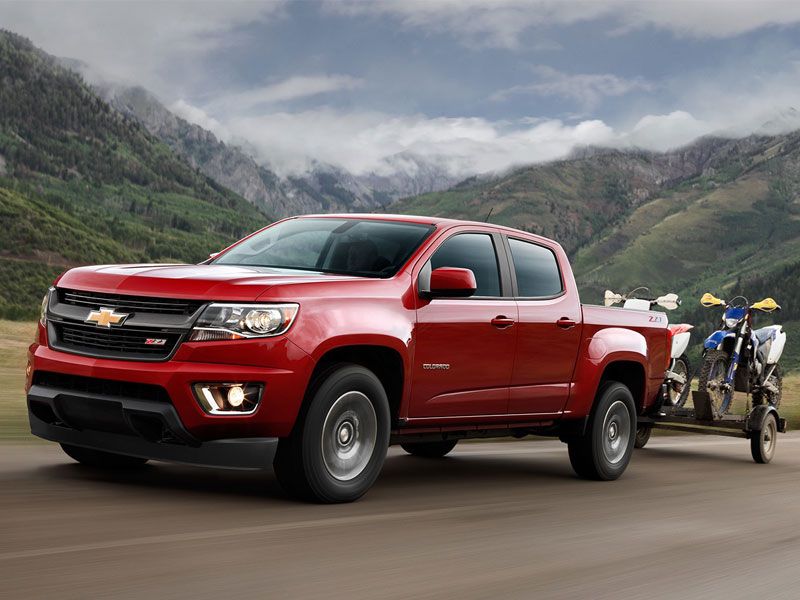
Photo by General Motors
Choices, choices, choices—just like a big truck.
Just like their full-size Silverado, Chevrolet offers the Colorado in a wide variety of sizes and trim levels. First, one must choose a size: Either an extended cab with a 6'2” box or a 4-door crew cab with a 5'2” or 6'2” box. (We recommend the longer box for towing, as the extra wheelbase gives added stability.) Then there are the trim levels: Base, WT, LT, and Z71. Power: 4-cylinder, 6-cylinder, or diesel, plus one must decide on 4x2 vs 4x4. The most basic configuration of the truck costs $20,995; the most expensive is upwards of $50,000. Still, that's not a crazy price spread considering what full-size pickups are going for nowadays.
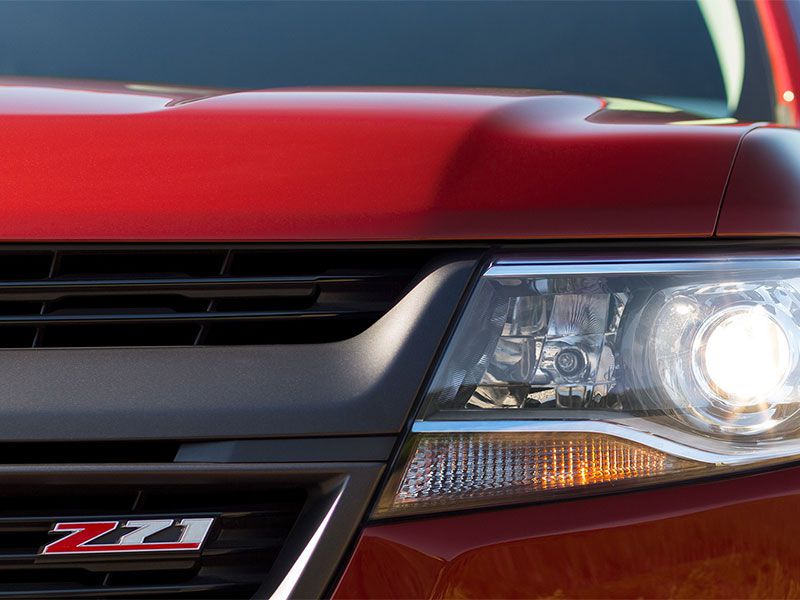
Photo by General Motors
Chevrolet Colorado vs. the competition
The Chevrolet Colorado faces three main competitors. Best known is the Toyota Tacoma. It has a reputation for bulletproof quality and it's a great off-road machine when properly equipped, but it doesn't tow as well as the Tacoma. The Honda Ridgeline is a great pickup to live with on a day-to-day basis; its ride is more comfortable and car-like than the Colorado, and the lockable trunk in the bed is an innovative feature. But it has more of a part-time work ethic. Its tow rating tops out at 5,000 lbs, but even towing 2/3rds of that weight it's not as stable as the Chevy. Nissan's Frontier is a durable truck with a solid work ethic, but Nissan hasn't updated it in years and it's not aging well. Among this group, only the Colorado truly approaches the real-world hauling capabilities of a half-ton truck.
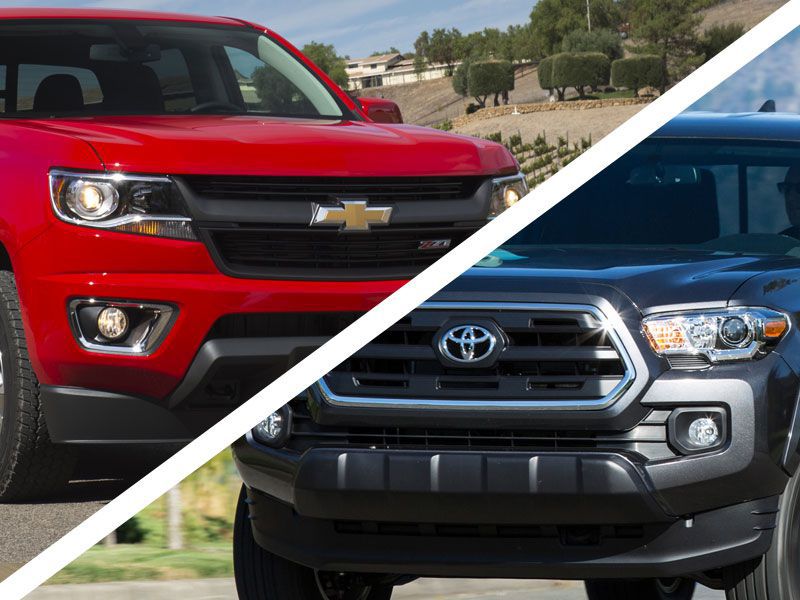
Photo by Toyota and General Motors
Conclusion: Chevy, don't change a thing
After a week with the Colorado, I came to the conclusion that there's really not much Chevrolet could do to improve this truck. I'd like to see a little work done on the cabin; no changes to the layout, but an interior more in keeping with Chevrolet's nicely-trimmed Silverado full-size trucks would be nice. But other than that, I wouldn't want Chevrolet to change a thing. The Colorado strikes a great balance between capability and size. We used it for the same jobs as our ol' reliable three-quarter-ton Chevy, and found that it hauls heavy loads and tows midsize trailers better than its competitors, and yet it's easier to park, easier to drive, and easier to live with than a full-size truck. Could we ask anything more from a midsize truck? I don't think we could.
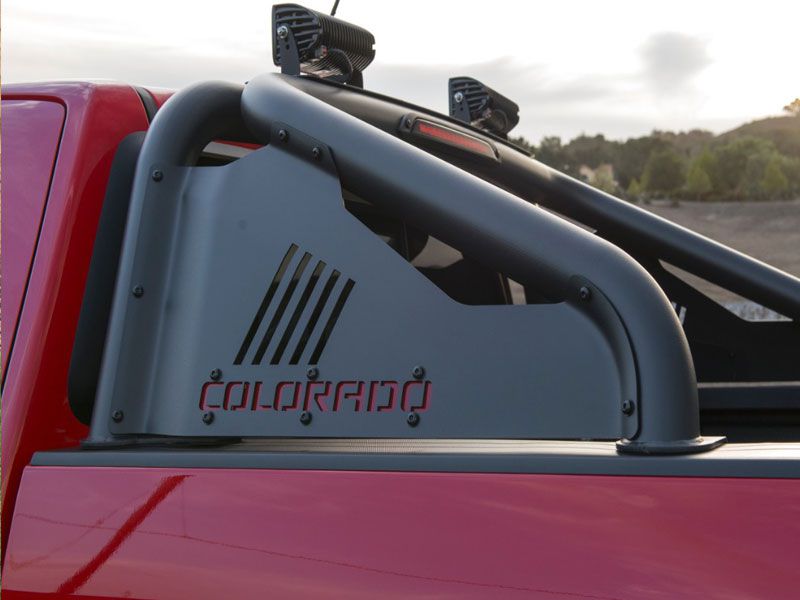
Photo by General Motors